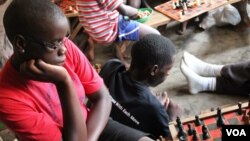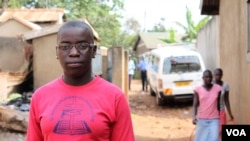KAMPALA —
Phiona Mutesi, 16, grew up in a Kampala slum and learned chess from a mission when she stumbled in looking for free food. Now she's an international chess champion, playing in tournaments around the world.
The city's impoverished Katwe slum seems an unlikely place to pick up a game of chess. But that is exactly what a room full of local children are doing, some perched on wooden benches, others sitting on the floor. This is where Uganda’s most improbable chess champion, Phiona Mutesi, first laid eyes on a board. “They accepted me, but the first day they didn’t because I was very dirty," she recalled. "They didn’t accept me even to touch the pieces.”
Happenstance
Mutesi started playing when she was nine-years-old. She had dropped out of school, and was selling corn on the street. Mutesi heard that the US-based Sports Outreach ministry was teaching chess to slum children, she says, but she only came because she knew they were serving porridge as well.
“We were evicted out of our house because we couldn’t afford that money. So when I heard that, I was like, ‘maybe I can also get there to know about chess and then I get a cup of porridge’, because I was hungry [at] that time,” she explained.
In Uganda chess is seen as a white man’s sport, and too difficult for girls. But Mutesi turned out to be something of a prodigy, and began qualifying to represent Uganda in international tournaments. She has competed twice in the International Chess Olympiad, and is now considered the best female player in the country.
But Robert Katende, who runs the Katwe chess program, thinks there is more to Mutesi than just raw talent. There is something about slum life that makes these kids particularly adept at the game, he says.
“I very much believe that having gone through all they go through right from childhood, figuring out how to survive on a daily basis, they do easily identify themselves with the board because when they come to play, they have still to face challenges," Katende noted. "Devise moves, think what will be the next step, what will come after that. Which I think somehow makes them understand it better.”
More than child's play
Unlike most young chess players, the children in Katende’s program do not have computers. They train by playing one another, using battered boards and grubby wooden pieces. Nor have they studied books of openings and combinations, which, says Katende, makes them unpredictable opponents.
“No combinations, no memorizing lines, nothing whatsoever. It’s always, think at the situation and devise the best move. Many people actually lose games to these children, simply because of that, I believe," said Katende. "Because they expect them to play certain lines, and they don’t. They end up playing their own game.”
Book and a movie
Mutesi’s unusual story is the subject of a book, “The Queen of Katwe”, published last October. She has even caught the attention of Disney, which has plans to make a movie about her.
But she has also inspired the people around her, especially the children of Katwe. Her brother Brian Mugabi admits that when Mutesi first started chess, the boys did not think she would be worth playing against. “They never wanted to play with girls, because girls were easy. The girls were actually not good,” he stated.
Now, says Mugabi, even the boys see her as a role model. “I think that challenges boys so that also they can be like her. So they have to train very hard and to put in very much so that they can be better," he said.
Mutesi says chess has changed her own perspective as well. She is back in school, the money from Disney bought her family some land, and she dreams of becoming a chess Grandmaster and a doctor. She never imagined such a life when she was a child, she says. “I was behaving badly, you couldn’t believe. But right now I behave well," she noted. "I didn’t have hope [at] that time, but now I’m having hope of becoming a doctor. I was just thinking about how I’m going to go through that day, that’s all.”
Mutesi was named Candidate Master last year, the lowest-ranking title in the World Chess Federation. It is a first step, says Katende, and she has great potential. But Uganda has never produced a Grandmaster before, and there are still plenty of hurdles in her way.
The city's impoverished Katwe slum seems an unlikely place to pick up a game of chess. But that is exactly what a room full of local children are doing, some perched on wooden benches, others sitting on the floor. This is where Uganda’s most improbable chess champion, Phiona Mutesi, first laid eyes on a board. “They accepted me, but the first day they didn’t because I was very dirty," she recalled. "They didn’t accept me even to touch the pieces.”
Happenstance
Mutesi started playing when she was nine-years-old. She had dropped out of school, and was selling corn on the street. Mutesi heard that the US-based Sports Outreach ministry was teaching chess to slum children, she says, but she only came because she knew they were serving porridge as well.
“We were evicted out of our house because we couldn’t afford that money. So when I heard that, I was like, ‘maybe I can also get there to know about chess and then I get a cup of porridge’, because I was hungry [at] that time,” she explained.
In Uganda chess is seen as a white man’s sport, and too difficult for girls. But Mutesi turned out to be something of a prodigy, and began qualifying to represent Uganda in international tournaments. She has competed twice in the International Chess Olympiad, and is now considered the best female player in the country.
But Robert Katende, who runs the Katwe chess program, thinks there is more to Mutesi than just raw talent. There is something about slum life that makes these kids particularly adept at the game, he says.
“I very much believe that having gone through all they go through right from childhood, figuring out how to survive on a daily basis, they do easily identify themselves with the board because when they come to play, they have still to face challenges," Katende noted. "Devise moves, think what will be the next step, what will come after that. Which I think somehow makes them understand it better.”
More than child's play
Unlike most young chess players, the children in Katende’s program do not have computers. They train by playing one another, using battered boards and grubby wooden pieces. Nor have they studied books of openings and combinations, which, says Katende, makes them unpredictable opponents.
“No combinations, no memorizing lines, nothing whatsoever. It’s always, think at the situation and devise the best move. Many people actually lose games to these children, simply because of that, I believe," said Katende. "Because they expect them to play certain lines, and they don’t. They end up playing their own game.”
Book and a movie
Mutesi’s unusual story is the subject of a book, “The Queen of Katwe”, published last October. She has even caught the attention of Disney, which has plans to make a movie about her.
But she has also inspired the people around her, especially the children of Katwe. Her brother Brian Mugabi admits that when Mutesi first started chess, the boys did not think she would be worth playing against. “They never wanted to play with girls, because girls were easy. The girls were actually not good,” he stated.
Now, says Mugabi, even the boys see her as a role model. “I think that challenges boys so that also they can be like her. So they have to train very hard and to put in very much so that they can be better," he said.
Mutesi says chess has changed her own perspective as well. She is back in school, the money from Disney bought her family some land, and she dreams of becoming a chess Grandmaster and a doctor. She never imagined such a life when she was a child, she says. “I was behaving badly, you couldn’t believe. But right now I behave well," she noted. "I didn’t have hope [at] that time, but now I’m having hope of becoming a doctor. I was just thinking about how I’m going to go through that day, that’s all.”
Mutesi was named Candidate Master last year, the lowest-ranking title in the World Chess Federation. It is a first step, says Katende, and she has great potential. But Uganda has never produced a Grandmaster before, and there are still plenty of hurdles in her way.





